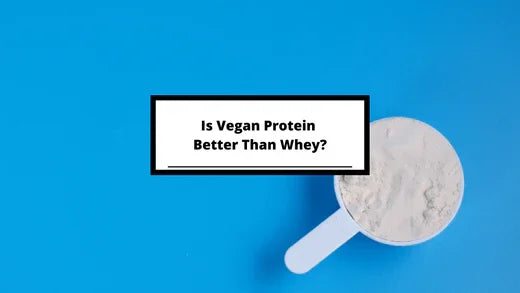Is Vegan Protein Better Than Whey?

Introduction
Ever wondered if vegan protein powders are better than whey? While whey protein powders may be cheaper, Vegan protein powders are healthier for both people and the planet, and have become more widely available in recent years as companies chase the plant-based trend.
Are vegan proteins the right option for you? Read our blog post to find out more.
Whey protein is by far the most popular form of protein powder.
Whey protein is by far the most popular form of protein powder. We'll go into more detail about why it tops the list below, but first let's look at how whey stacks up against other forms of animal-based protein (and some plant-based proteins as well).
What makes whey so popular?
Whey has a number of advantages over other forms of animal-based protein, including:
-
It's easy to digest, making it ideal for post-workout recovery and muscle growth.
-
It contains all nine essential amino acids that your body needs to build muscle—something few other sources offer.
It's also a good source of branched-chain amino acids (BCAAs), which are important for muscle growth. And unlike some plant-based proteins, whey doesn't contain as much fiber or carbohydrates.
Bottom line: whey is by far the most popular form of protein because it's easy to digest and contains all nine essential amino acids. It also has a low amount of fiber and carbohydrates, which makes it ideal for post-workout recovery and muscle growth.
Plant-based protein powders are better for the planet than whey.
Whey protein is made from cow's milk, which means that it’s not vegan or vegetarian. It also takes a huge amount of water to produce; 1 gallon (3.8 liters) of water is used for every pound (0.45 kilograms) of whey produced. This makes whey protein powder an unsustainable ingredient and not good for the planet—plus, it can cause major harm to cows in the dairy industry due to their cruel treatment during production.
On top of all this, whey comes with some health risks: If you have lactose intolerance or are sensitive to milk proteins, you may want to avoid consuming whey at all costs because it will likely make you sick!
In comparison with plant-based protein powders like hemp and pea protein powders (and even soy), which are 100% vegan friendly regardless of how they're processed...
While it's true that plant-based protein powders might not be as cheap as whey, they're a much healthier option for your body. They are also better for the planet and way more sustainable than whey protein powder. So if you're going to buy protein powder, choose a vegan one over an animal-based variety.
Vegan protein powders are easier to digest than whey.
Another way to answer this question is to take into account what your body needs. If you're trying to build muscle, then whey might be the better option for you. But if you want something that's easier on your digestive system and doesn't cause bloating and gas, vegan protein powders are a great choice.
In addition to the fact that vegan proteins are more easily digested than whey proteins, they also tend to contain less lactose (milk sugar). This means there's less chance of digestive upset for people who have trouble digesting dairy products.
- Whey protein contains all nine essential amino acids, which are the building blocks of muscle. This means that if you're serious about working out and building muscle, whey is a must-have in your diet.
- It's also a great source of the branched-chain amino acids leucine, isoleucine, and valine (BCAAs). These BCAAs help build muscle tissue by increasing protein synthesis—the process by which your body uses protein
- A lot of people have allergies to dairy products, which means they may not be able to consume whey protein. In that case, vegan protein powder is a great option.
- Vegan protein powders contain fewer calories than whey proteins and often have no added sugar or carbohydrates. That means they can help you lose weight more easily.
- Vegan protein powders contain fewer calories than whey proteins and often have no added sugar or carbohydrates. That means they can help you lose weight more easily.
Vegan protein powders fill more nutritional gaps, from fiber to iron and calcium.
If you're a vegan, you might find that vegan protein powders fill more nutritional gaps than whey. Each one has its own unique blend of essential vitamins and minerals, but plant-based proteins generally contain all the essential amino acids in higher quantities than animal products. Some brands even offer additional nutrients like fiber or iron, so you can customize your powder to meet your specific dietary needs.
Vegan proteins are made from plants—and plants are naturally rich in these nutrients!
Many people who follow vegan diets struggle with anemia, low energy levels, or other issues related to a lack of iron in the body. So it's important that you choose a powder that contains at least some amount of this mineral (in addition to calcium and other minerals). Most vegan proteins contain between 1-3 grams per serving size—about 15 percent of what you'd get from foods like dark leafy greens/seeds/legumes.
However, note that not all vegan protein powders are created equal. Some brands are higher in fiber than others, and each one has its own unique blend of essential vitamins and minerals (like iron). You'll want to choose a powder that contains at least some amount of these nutrients (in addition to calcium, which is important for bone health). It's also worth noting that many vegan athletes struggle with anemia due to low energy levels caused by a lack of iron in the body. So when choosing between whey or vegan protein powders, it's important to know what nutrients you're missing out on—and how much of each you need. Otherwise, if your diet doesn't contain enough fiber/iron/calcium (in addition to other minerals), then it may be worth considering whether something else could fill those nutritional gaps more effectively.
A 2009 study in the Journal of Nutrition and Metabolism found that vegan proteins fill more nutritional gaps than whey, from fiber to iron and calcium. Those nutrients are important for a healthy diet, and most vegan protein powders are made from plants, which are naturally rich in these nutrients. You'll want to choose a powder that contains at least some amount of these vitamins and minerals (in addition to calcium).
There are more vegan protein powder options out there, making it easy to find one that tastes good to you.
You may be surprised to learn that there are actually a wide variety of vegan protein powders out there. They come from a number of sources, including peas and brown rice. Some flavors include chocolate peanut butter and cookies 'n cream.
These options make it easy for vegans to find something that tastes good to them, since they can choose the flavor and source of their protein powder based on personal preference rather than simply settling for what's available at the time or having no choice at all (as is often the case with whey-based protein powders).
In the past, there were limited vegan protein powder options. But in recent years, many companies have realized consumers are looking for more variety and have responded.
Vieve has recently launched the world's 1st vegan protein water - creating a plant-base version of their popular collagen based protein drinks. The product comes in two flavours and has 10g protein, zero sugar fat or dairy and only 50 calories. It's one example of a company creating a line of products to make it easier for vegans and those on flexitariant diets to increase their protein intake.
Vegan protein powders have a lot of benefits for people and the planet that whey does not.
Vegan protein powders have a lot of benefits for people and the planet that whey does not.
Whey protein is popular because it's cheap, but vegan alternatives are generally easier to digest, have more nutritional benefits, and are more widely available. In addition to being great for your health (and your wallet), they're also kinder to animals and better for the environment than whey.
- Vegan protein powders are better for the planet
- Vegan protein powders are easier to digest
- Vegan protein powders have more nutritional benefits
- Vegan protein powders are more widely available
- Whey protein powders are more popular
There are three main types of vegan protein powder: soy, pea and hemp. Soy-based protein powders are made from soybeans, which have high amounts of glutamine (an amino acid). Hemp protein powder is an excellent alternative because it's not only low in fat but contains all nine essential amino acids as well. Pea based proteins have become a lot more common in recently years, and are often used in drinks such as Vieve's vegan protein waters.
Conclusion
All in all, we’d say yes, vegan protein is better than whey. It’s healthier, it has a lower impact on the environment and it doesn’t have any of those nasty hormones or additives. On top of that, most plant-based proteins are cheaper than their animal counterparts—even after you factor in the cost of making them. So if you’re looking to get more protein into your diet without breaking the bank or harming animals? We think this is a great way to do it!
Looking for an easy plant-based protein solution? Try Vieve's Vegan Protein Waters. Each bottle contains 10g protein, zero sugar fat or dairy and only 50 calories. Plus its easy to drink on the go, so no mixing and no mess!
